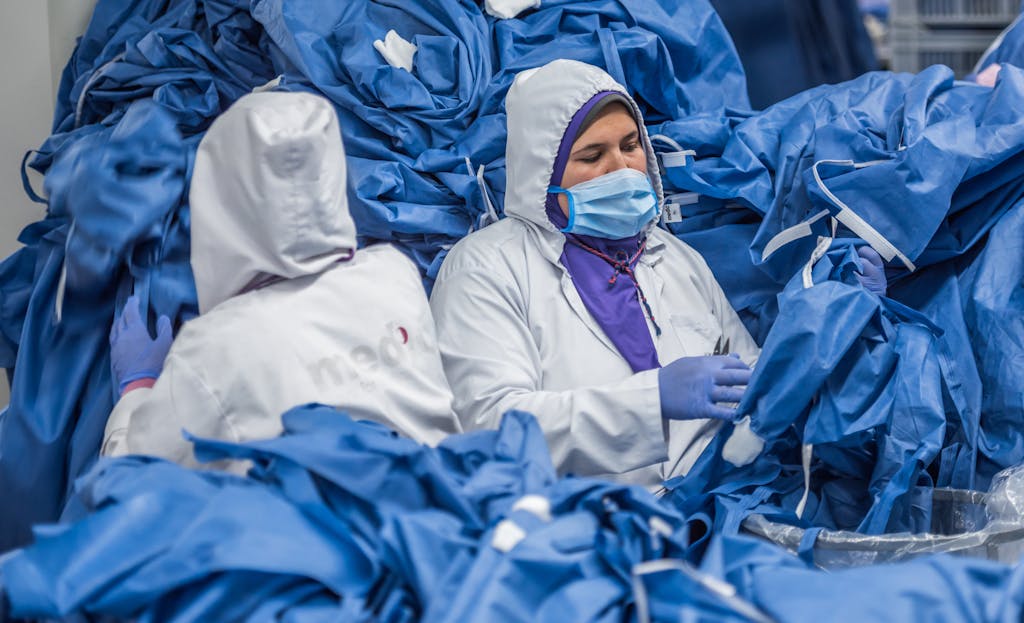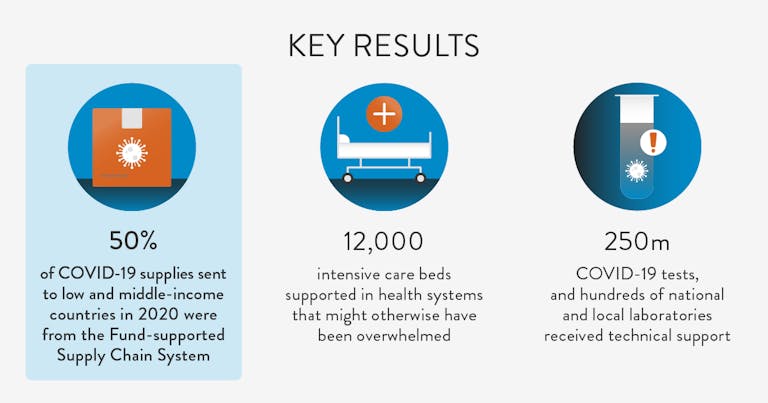The world has never seen a health crisis like COVID-19. It has impacted communities everywhere in all aspects of our lives. There has never been a stronger, more urgent case for global cooperation because no one is safe until everyone is safe. In early 2020, as the pandemic spread at lightning speed, the World Health Organization (WHO) reached out to the UN Foundation to help build momentum and support for its role in leading and coordinating global efforts to prevent, detect, and respond.
“COVID-19 is an unprecedented pandemic requiring extraordinary global solidarity to urgently respond,” said Dr. Tedros Adhanom Ghebreyesus, WHO Director-General.
Just over two weeks later, the UN Foundation and WHO together launched the COVID-19 Solidarity Response Fund, in partnership with the Swiss Philanthropy Foundation, as the first and only way for individuals and companies everywhere to support WHO’s global response. As the pandemic overwhelmed global health systems, shocked economies, and sent societies into lockdown, speed was of the essence.
“We can’t ignore the fact that this is a truly global problem – one that requires truly global solutions,” said Elizabeth Cousens, UN Foundation President and CEO. “The case for global cooperation could not be clearer – communities everywhere are affected, and people want to contribute.”
Social distancing, mask-wearing, hand-washing — the virus reminds us that individual actions impact each other. And the Fund showed us that, even though people were apart, they were together in spirit and mission, spurred by the understanding that everyone is affected, and everyone can do something to help.
From the Irish woman doing 8000 squats, to Snapchat creating a special augmented reality filter, to mega donations from global brands including Facebook, GSK, Cisco, Citi, and FIFA, and 12-hour gaming ‘streamathons’, people and organizations from all over the world dug deep.
Lady Gaga, Miley Cyrus, Adam Lambert and Queen, Rita Ora, Harry Styles, Mr Bean, the Minions – these were just some of the entertainment superstars who stepped up for WHO through the COVID-19 Solidarity Response Fund.
“I couldn’t sit back and do nothing,” said Youtube star Jacksepticeye, who raised more than $660,000 from his fans alone during Hope from Home, an innovative 12-hour streamathon on the Tiltify platform that in total raised more than $2 million for several efforts to tackle COVID-19, including the Solidarity Response Fund.
“We’re all stuck inside due to self-isolating, but the power of the internet allows us to still bridge that gap, come together and make a difference.”
Many global companies played their part in different ways, including repurposing production lines to manufacture much needed personal protective equipment, as in this moving video from Swedish hygiene and health brand Essity.
The message that powered WHO’s global response, and UN Foundation’s efforts in support, was simple: everyone everywhere is at risk, and everyone everywhere can do something to help. Here at the UN Foundation, partnership is in our DNA, and we developed a unique customizable model in collaboration with WHO so that celebrities, influencers, and companies everywhere could authentically play their part — by reaching their own networks, consumers, and audiences with important public health information, and an opportunity to donate.

Collaborative relationships nurtured over years with a host of partners — including global businesses, tech platforms, the TV and film industry, digital influencers, networks of engaged citizens, and like-minded organizations — acted as force multipliers for global solidarity. As well as a who’s who of the entertainment world, the Solidarity Response Fund benefited from donate buttons on major platforms including TikTok and Youtube; dedicated proceeds from products by global brands such as Ralph Lauren, CLOAK, and Adidas; and millions of dollars of donated ad space for PSAs from media giants including Amazon, Bloomberg, and Vice Media. The communications and PR campaign we mounted for the Fund received 10 industry awards and honors.
What we learned quickly is that solidarity is also contagious. Within six weeks, the Fund surpassed $200m in donations from more than 500,000 individuals around the world, and more than 150 global companies. The Fund quickly became the second biggest single contributor to WHO’s COVID-19 response, after the German government. One year after its launch, almost two-thirds of a million people from 190 countries had helped raise nearly a quarter of a billion dollars for the global COVID-19 response. That’s what solidarity looks like.
We designed the Fund to be fast and flexible, so WHO was able to get resources to where they were most urgently needed. This critical early funding helped WHO deliver hundreds of millions of pieces of personal protective equipment (PPE), start vaccine trials in over 100 countries, develop training tools in 44 languages, and combat the growing threat of COVID-19 misinformation. Donations have also supported the pandemic work of UNICEF, the World Food Programme (WFP), the UN Refugee Agency (UNHCR), the UN Relief and Works Agency for Palestine Refugees in the Near East (UNRWA), the World Organization of the Scout Movement (WOSM), and the vaccine development alliance CEPI. The scale and geographical spread of the Fund’s impact was staggering.

Helping UNHCR provide medical and hygiene supplies so that nurses such as Iraqi refugee Moheyman can help COVID-19 patients.
Meet nurse Moheyman
Strengthening health systems against COVID-19 in countries like Somalia.
Explore WHO’s work in Somalia
Overcoming supply chain hurdles and securing supplies to be distributed to hard-hit countries.
See how WHO delivered supplies
Fund resources have also helped WHO tackle the rapid spread of misinformation, rumors, and conspiracy theories about the virus.
Learn more about the infodemic
We’ve all learned many lessons from living under a pandemic for more than a year. For the UN Foundation, it’s underlined the urgency of our long-standing mission, and redoubled our commitment. For more than 20 years, we have worked to help the UN enhance global cooperation to tackle urgent challenges and drive progress for everyone. The pandemic has emphasized the transformative power of what the world can do when we join forces across countries, communities, and sectors.
The COVID-19 crisis has shown us exactly why the UN and agencies like WHO exist, and what it takes to make them thrive and work for everyone, everywhere. The crisis has also shown that we need holistic, inclusives approaches because issues connect – from our economies to our food systems to our health – so our solutions must too.
Fund supporters understood the need to respond quickly and collectively in the face of a global crisis. The challenges we will face will also require redoubled efforts to strengthen the bonds of international cooperation today in order to address persisting challenges tomorrow, including the climate crisis, insecurity and conflict, and widening inequalities.
An independent evaluation praised the Fund’s design and impact, and you can read a fuller account of the Fund’s first year here. A Playbook has also been published as a guide to the Fund’s collaborative journey, and to serve as a resource for future endeavors.
The COVID-19 hurdle has not yet been cleared. Countries have been disproportionately impacted, with low- and middle- income countries bearing the brunt of the pandemic’s fallout. There remains an overwhelming need for greater global solidarity, especially in the face of low global vaccination rates, new variants, and ongoing misinformation. And we still need WHO’s crucial coordination of the worldwide response to end the pandemic, and its efforts to enable equitable access to COVID-19 tests, treatments, and vaccines.
From March 2021, the UN Foundation transferred administration of the COVID-19 Solidarity Response Fund to the WHO Foundation.